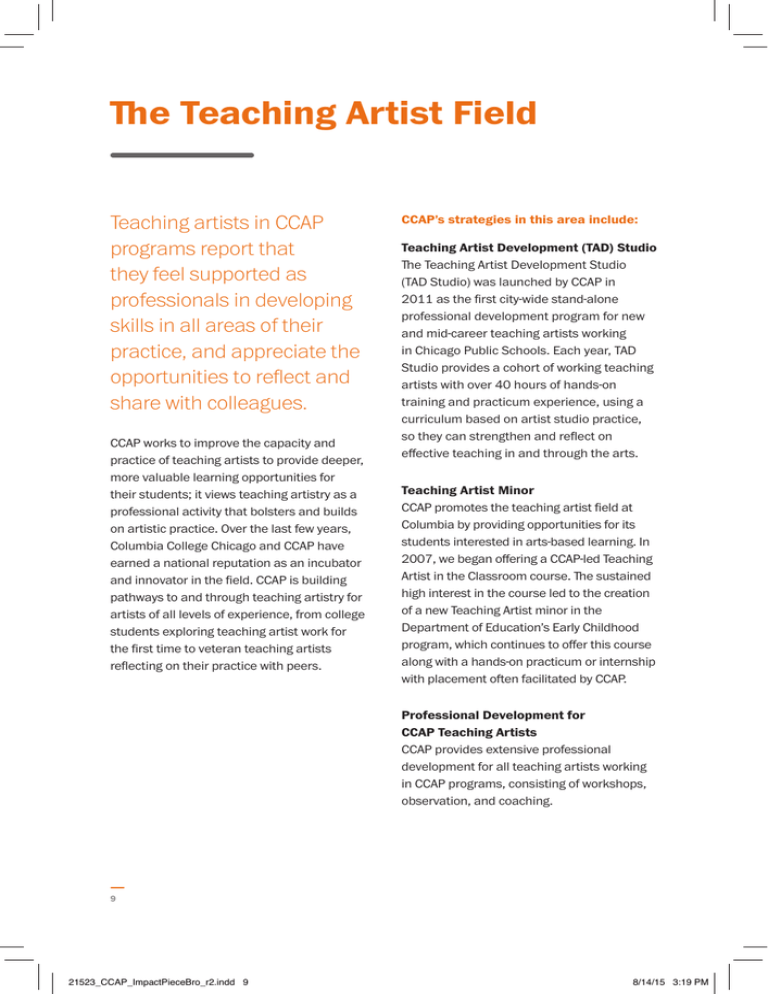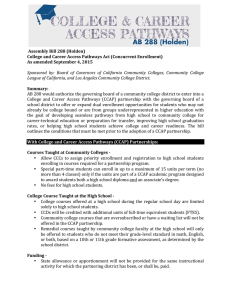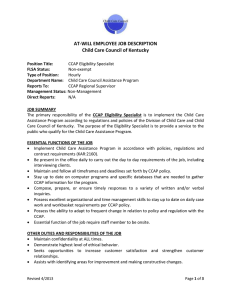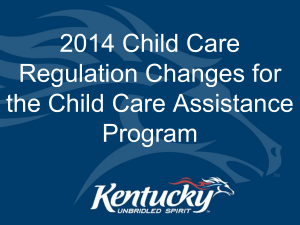The Teaching Artist Field Teaching artists in CCAP programs report that
advertisement

The Teaching Artist Field Teaching artists in CCAP programs report that they feel supported as professionals in developing skills in all areas of their practice, and appreciate the opportunities to reflect and share with colleagues. CCAP works to improve the capacity and practice of teaching artists to provide deeper, more valuable learning opportunities for their students; it views teaching artistry as a professional activity that bolsters and builds on artistic practice. Over the last few years, Columbia College Chicago and CCAP have earned a national reputation as an incubator and innovator in the field. CCAP is building pathways to and through teaching artistry for artists of all levels of experience, from college students exploring teaching artist work for the first time to veteran teaching artists reflecting on their practice with peers. CCAP’s strategies in this area include: Teaching Artist Development (TAD) Studio The Teaching Artist Development Studio (TAD Studio) was launched by CCAP in 2011 as the first city-wide stand-alone professional development program for new and mid-career teaching artists working in Chicago Public Schools. Each year, TAD Studio provides a cohort of working teaching artists with over 40 hours of hands-on training and practicum experience, using a curriculum based on artist studio practice, so they can strengthen and reflect on effective teaching in and through the arts. Teaching Artist Minor CCAP promotes the teaching artist field at Columbia by providing opportunities for its students interested in arts-based learning. In 2007, we began offering a CCAP-led Teaching Artist in the Classroom course. The sustained high interest in the course led to the creation of a new Teaching Artist minor in the Department of Education’s Early Childhood program, which continues to offer this course along with a hands-on practicum or internship with placement often facilitated by CCAP. Professional Development for CCAP Teaching Artists CCAP provides extensive professional development for all teaching artists working in CCAP programs, consisting of workshops, observation, and coaching. 9 21523_CCAP_ImpactPieceBro_r2.indd 9 8/14/15 3:19 PM Impact on Teaching Artists 2013–2014 Increased Confidence 87.5% TAD Studio participants have said: “ TAD Studio provided me with a lot of practical teaching tools that I either can use as they are or modify to make my own… Overall I just feel more prepared… ” +32.5% 55% BEFORE AFTER TAD Studio participants’ level of confidence in using arts integration strategies increased from 55% before the program to 87.5% after, an increase of 32.5%. Increased Knowledge ideas have shifted to “ My think of my work in the classroom as an extension of my arts practice and not something I do on the side. This shift in ideas has made me a better teaching artist. ” 90% 55% +35% BEFORE AFTER TAD Studio participants’ level of understanding of arts integration jumped from 55% before the program to 90% after, an increase of 35%. Increased Understanding 95+5+L 93+7+L 21523_CCAP_ImpactPieceBro_r2.indd 10 95% Understanding how my core values as an artist are reflected and impact my teaching practice 93% Understanding of how arts integration curriculum can connect rather than fragment ideas across subject areas. 10 8/14/15 3:19 PM Teaching Artist Kristina Gosh Digital media teaching artist and Columbia College Chicago alumna, Kristina Gosh, first started working at CCAP in the TEAM program in 2011. In the reciprocal way that happens at CCAP, she’s learned as much as she’s taught. Kristina’s collaboration with a teacher at Gray Elementary School, Dina Alikakos, has fostered groundbreaking work in the classroom that she has found “most engaging.” Over the years, they have built on a shared approach to teaching that values inquiry, discussion, and analysis, not just feeding information to kids. Through CCAP’s professional development, Kristina learned that theorists like Henry Jenkins had names for concepts and tactics they’d already been carrying out, like “third-space learning” and “affinity spaces.” This “incredible partnership” has changed Kristina. She is more open to asking young people to engage in self-reflection, to think and speak critically about what they’re making and why. She and Dina also now dive deeper into complex, social justice issues and stories in the news like human trafficking and violence. “Now I realize these kids can take it.” These changes have also enhanced Kristina’s teaching in her role as adjunct faculty in the Television Department at Columbia College. Kristina values CCAP’s professional development and the “strong sense of community amongst the cadre” of CCAP teaching artists, which have helped expand her professional network and allowed her to learn from peers. Through CCAP, Kristina also had the opportunity to adjudicate an early childhood arts competition in Shanghai, China. Just as young people are finding new ways and media to express themselves, Kristina declares that she too is developing a stronger voice through her experience at CCAP: “It’s like empowerment through osmosis.” 11 21523_CCAP_ImpactPieceBro_r2.indd 11 8/14/15 3:20 PM 21523_CCAP_ImpactPieceBro_r2.indd 12 8/14/15 3:20 PM Community Impact As a result of their involvement in CCAP programs, K–12 students and community members have improved their artistic/creative skills, increased their understanding and appreciation of the arts, and enhanced their social/emotional wellbeing. Students are more engaged in school and motivated to learn, demonstrate higher academic performance, and improve their higherorder thinking skills. CCAP’s focus in the community is to extend the learning environment for K–12 students and other community members through the arts and media. CCAP creates deep, long-term, mutually beneficial partnerships with schools and communitybased organizations to do this work. Examples of CCAP programs include: Urban Missions CCAP’s founding program nurtures a network of Chicago community-based organizations and Columbia academic departments and centers. Each semester, College faculty members collaborate with community-based organizations to create experiential learning courses as well as arts projects in the community. Convergence Academies An initiative supported by an Investing in Innovation (i3) grant from the U.S. Department of Education, Convergence Academies is a whole school model that integrates digital media into all aspects of curricula and instruction. Convergence Academies is both a place-based, designed, learning environment and a relationshipbased coaching model that empowers teachers as designers of new pedagogical approaches using digital media tools. Community Schools Partnerships This program provides comprehensive outof-school programs to support students’ academic achievement and social/ emotional development through high-quality arts learning, tutoring, mentoring, health & fitness, college readiness, and parent engagement strategies. 13 21523_CCAP_ImpactPieceBro_r2.indd 13 8/14/15 3:20 PM Impact on Children & Youth 2013–2014 Improved Critical Thinking Skills Arts Integration Mentorship Project (Project AIM) This program pairs teaching artists with teachers to create curricula that integrates the arts with academic content such as science, math, language arts, and social studies. A related program, Transforming Education through the Arts and Media (TEAM), recently wrapped up its programming focused on arts integration in digital media in technology magnet cluster schools in Chicago. Louis Armstrong Legacy Program and Celebration (LALPC) Originally launched by the Chicago Jazz Ensemble, LALPC brings professional jazz musicians into Chicago Public Schools to work with student jazz ensembles of all skill levels. 90% 86% +12% +10% 78% 76% BEFORE AFTER Students’ ability to recognize prejudice or bias in media increased 78% to 90%. Students’ attention to how people of their age, ethnicity, and gender are represented in movies, TV shows, and magazines increased 76% to 86%. Enhanced Social/Emotional Learning 89% OF STUDENTS 85% OF TEACHERS “ [Convergence Academies is] putting students in the position to take control of their learning, to be lifelong learners, because now they know how to access information [from a] variety of sources. ” ­—Convergence Teacher 21523_CCAP_ImpactPieceBro_r2.indd 14 98% OF PARENTS 0% 100% Reported that Community Schools students developed a positive identity through participation in the program. 76+10+L240 90+ 90+10+L Increased Achievement & Engagement 76% Convergence students who increased test scores from previous year 92% TEAM students who said the program helped them be more actively involved in their class 14 A 8/14/15 3:20 PM Community Partner Na-Tae’ Thompson & True Star A decade ago, Na-Tae’ Thompson and a colleague founded True Star, a youth-driven media outlet that provides after-school and summer apprenticeships for teens. With a bachelor’s and master’s degree from Columbia College Chicago, Na-Tae’ knew there would be great potential in partnering with the college. She sought out CCAP, which she had become familiar with through her Arts and Youth Community Development (AYCD) master’s degree program at Columbia. CCAP had supported the AYCD program by creating internship practicum sites for students. When Na-Tae’ approached CCAP as a potential partner for True Star, a similar vision of internship placements was born. Through CCAP, Columbia students from departments such as Journalism now work with True Star to help produce the content and design for the organization’s magazine, radio show, and website. Na-Tae’ is proud that her organization provides “real experiences versus theory” for teens and Columbia College students alike, and helps build their portfolios by crediting them by name in the magazine. Additionally, Na-Tae’ believes True Star is a “gateway to Columbia” because it allows young people to interact directly with college students and build relationships and a deeper understanding of college. As a result, many have chosen to attend the College. True Star’s membership as a CCAP Urban Missions partner has yielded many tangible benefits for the organization. Na-Tae’ values CCAP for bringing together ethnically diverse organizations across the city to connect and share resources. “We’re in silos and segregated” across most communities and industries in Chicago, she says, but CCAP helps combat that: “[CCAP is] kind of like the middleman for a lot of connectivity in the city.” 15 21523_CCAP_ImpactPieceBro_r2.indd 15 8/14/15 3:20 PM 16 21523_CCAP_ImpactPieceBro_r2.indd 16 8/14/15 3:21 PM colum.edu/ccap 21523_CCAP_ImpactPieceBro_r2.indd 17 8/14/15 3:21 PM


